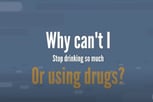Recovering from addiction is often a rocky and treacherous road. For women, however, the hurdles are significantly more difficult due to the integral roles they play in the lives of other people.
Oftentimes, besides being part of the modern workforce, women are also mothers, wives, daughters and sisters. Tack on long-held societal expectations, and it's easy to see why many of them simply choose to truck along instead of taking a timeout to go to rehab.
At New Directions for Women (NDFW), an Orange County-based nonprofit rehab facility, CEO Rebecca Flood and her team of specialists successfully close the gaps that open when women shift their focus on self-healing.
"When you take mom, or wife, or daughter out of her role, so much of her identity is wrapped up in that," Flood says. "What we do is we ensure that we get our arms totally wrapped around her, her pregnancy or her children, and the rest of her family."
Piecing the Facts Together
One United Nations study also found this to be universally true among women, pointing out that integrating specialized women's services that target their complex needs bumps up their chances of achieving long-term recovery.
Research also found that more women across the globe come into addiction treatment with interpersonal trauma, meaning they have a broader range of physical and mental needs that have to be weaved into their recovery plan.
"With us they receive a warm, safe and trusting person to speak to who will love them regardless of the story they have to share as well as give them options," Flood says. "The treatment has to match their challenges."
NDFW's 12-step inspired evidence-based treatment approach caters to women of any age and offers a continuum of care, including detox, long-term residential or intensive outpatient programs, trauma and experiential therapy, sober living and more.
Full-Service Care
In order to meet women at their point of need, NDFW's services include prenatal care, educating family members about addiction, and facilitating bonding time with family. They even find ways to afford school-aged children to enroll in a local school near the facility, or admit younger children and infants to their onsite day care while mothers go under treatment.
"[Women] have all the challenges that men have plus more," she says. "In removing these barriers, keeping at the forefront of all new research and also addressing one's spirituality, we're then able to improve outcomes over the long haul and open up opportunities that otherwise weren't necessarily there for them … I always call it 'the fire in the belly ignited.'"
Flood encourages all women struggling with addiction, as well as people who care for them, to reach out for help. Even if it's beyond their own services, the helpline team at NDFW directs everyone to the best possible fit according to the individual's circumstances. The first step is just to pick up the phone and call.
For those friends and family who are at a loss of what to do with their loved one in addiction, Flood gives the following words of advice, "Be kind enough and be gentle enough to guide them to the front door of someone or some place that can love them and help them until they are capable of loving and helping themselves." And to women, she says, "You're worth it."








